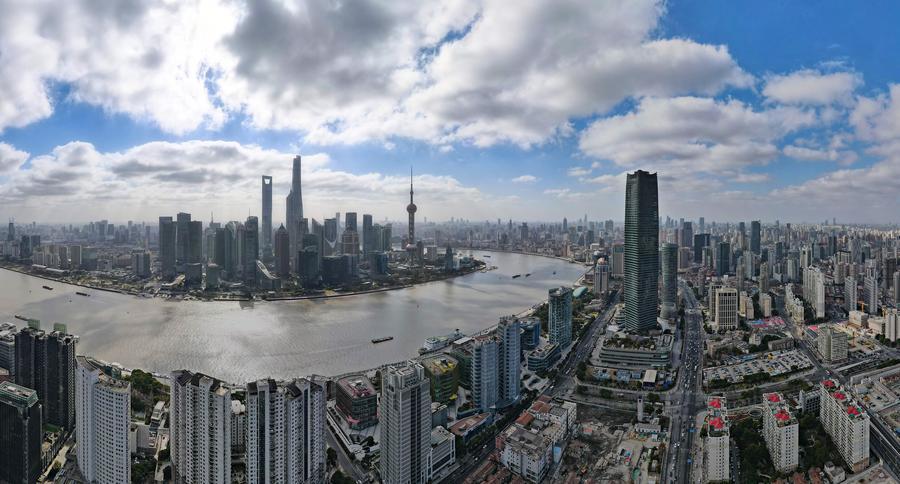
 0 Comment(s)
0 Comment(s) Print
Print E-mail Xinhua, November 19, 2024
E-mail Xinhua, November 19, 2024

This panoramic aerial photo taken on Jan. 10, 2023 shows a view of Lujiazui area in the China (Shanghai) Pilot Free Trade Zone in east China's Shanghai. [Photo/Xinhua]
Shanghai, a bustling metropolis with one of China's most dynamic premium real estate markets, announced on Monday plans to lower taxes on premium property sales starting Dec. 1.
According to the announcement, jointly issued by the Shanghai housing and urban-rural development commission, housing administration bureau, finance bureau and tax bureau, the city has eliminated the distinction between ordinary and non-ordinary housing when levying value-added taxes (VAT) and personal income taxes on property sales.
Amid a sluggish property market, China has introduced a series of measures in taxation, finance, and market policies that are designed to stimulate demand, reverse the market downturn and stabilize the market.
Industry insiders believe Shanghai's latest policy adjustments align with this broader trend. On Nov. 13, the Ministry of Finance announced plans to enhance incentives in terms of deed tax, land appreciation tax and VAT to support the steady and healthy development of the real estate sector.
Additionally, based on a resolution adopted at the third plenary session of the 20th Communist Party of China Central Committee, municipal governments like Shanghai have been granted greater decision-making powers to regulate the real estate market. Depending on local conditions, some cities will be permitted to abolish or relax restrictions on housing purchases and to scrap relevant standards for ordinary and non-ordinary housing.
The criteria for defining ordinary housing varies across different regions in China. In Shanghai, ordinary housing is defined as a multi-story residence with five or more floors or a low-rise dwelling with fewer floors, such as older-style apartments and lane houses. Additionally, the building area of a single unit is capped at 144 square meters or less.
Shanghai once implemented a differentiated personal income tax policy for real estate transactions. According to a 2006 directive issued by the local tax bureau, sales of ordinary housing were taxed at 1 percent of the transfer income, while non-ordinary housing was taxed at 2 percent.
With the planned elimination of the distinction between ordinary and non-ordinary housing, the unified tax rate is now set at 1 percent.
In terms of VAT on property sales, Shanghai plans to exempt individuals from a 5-percent VAT on the sale of non-ordinary properties that have been owned for two years or more. Industry insiders view this initiative as a significant benefit for property sellers.
According to Yan Yuejin, deputy director at E-house China R&D Institute, the reduction will not only benefit homeowners but the entire market as well.
"The reduction in selling costs for homeowners is expected to boost listing and sales activity, which will increase the availability of high-quality second-hand properties. This, in turn, provides homebuyers with more options and has a positive impact on the market," Yan said.
Meanwhile, Shanghai's new tax reduction measures also include benefits in deed tax policies. For homes measuring 140 square meters or less, the deed tax is reduced to the minimum rate of 1 percent, effectively covering the majority of first-time and upgrading homebuyers, thereby effectively supporting housing consumption.
The policy also provides notable relief for buyers purchasing a second home. For example, under the previous policy, a deed tax of up to 300,000 yuan (about 41,720 U.S. dollars) would apply to a home priced at 10 million yuan. With the new policy, the minimum deed tax is reduced to 100,000 yuan, offering a direct savings of 200,000 yuan.
Lu Wenxi, a market analyst with the real estate agency Centaline Property, said that the tax reduction is especially beneficial given the current market conditions, where there is still a pricing standoff between buyers and sellers.
"The tax savings of tens of thousands of yuan for sellers, coupled with reductions in deed tax for buyers, provide both parties with more room for negotiation," Lu added. "This creates a favorable environment for transactions, making it easier to close deals and help maintain a relatively high level of market activity."
Adding to the discussion, Yan believes that the optimization of Shanghai's real estate tax policies is based on the positive momentum in the real estate market.
"According to recent data from the National Bureau of Statistics, the price index for new and second-hand homes in 70 major cities across the country has shown a turning point, with the real estate market stabilizing and showing signs of improvement," Yan added. "Among these cities, Shanghai's indicators rank among the top nationwide."